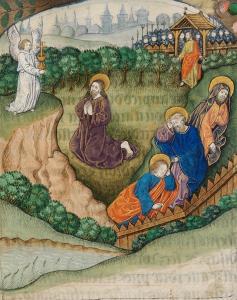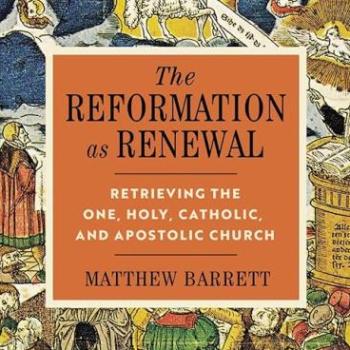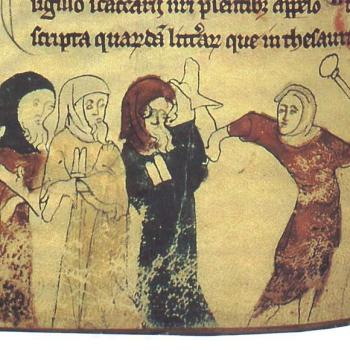 Have you heard the one about Bernard of Clairvaux, the peasant, and the horse? The abbot Bernard, so the legend goes, is riding down a country road one day when he meets a peasant. Now, being the friendly friar he is, Bernard strikes up a conversation with his new agrarian amigo, bemoaning the fact that his human condition, being incurvatus in se as they say, makes it hard to focus in prayer. “Not me,” the peasant boasts; “my heart’s good-to-go when it comes to oratio. You may be easily distracted, holy father, but me? I’m solid as a king’s knees in a three-day Bolognese blizzard.”
Have you heard the one about Bernard of Clairvaux, the peasant, and the horse? The abbot Bernard, so the legend goes, is riding down a country road one day when he meets a peasant. Now, being the friendly friar he is, Bernard strikes up a conversation with his new agrarian amigo, bemoaning the fact that his human condition, being incurvatus in se as they say, makes it hard to focus in prayer. “Not me,” the peasant boasts; “my heart’s good-to-go when it comes to oratio. You may be easily distracted, holy father, but me? I’m solid as a king’s knees in a three-day Bolognese blizzard.”
Well, Bernard quickly becomes convicted that it’s his divine duty to take this country fellow down a peg, so he says: “I’ll tell you what, friend. Walk down the road a bit and start praying the Lord’s Prayer. Muster up all the focus you can. Give it your all. Get those petition pistons pumpin’. If you can finish your prayer without any lallygagging or wandering thought, I’ll give you my horse right here and now. Only fess up if you stop short of ‘kingdom, glory, and power’.” Well, the man can’t refuse. A free horse just for praying? This card-cuttin’ Cluniac is fixing to be on a surprise pilgrimage. So, he begins to stroll down the way and recite the prayer just like he has since he was a boy:
Our Father who art in heaven, hallowed be thy name; thy kingdom come, thy will be done on earth as it is in heaven. Give us this day our daily——saddle…I’ll need a saddle; does the saddle come with the horse, or do I need to buy it off him?
The man came back to Bernard, chin shaking and face red as a flagellant’s favorite flannel. The outcome of our comrade’s paltry Pater Noster? Well, let’s just say, Father Bernie blessed the man with a gleam in his eye and kept riding on his way. And the peasant, horseless and humiliated, never gloated over his prayer abilities again.
Prayer is hard. And medieval Christians were well aware of that fact. As committed to purity in prayer as medieval religious were, they had no delusions about the weakness of mind that often accompanied the prayers of the faithful (including them). Pithy and pious stories from saints’ lives, like the one above, were recited again and again as reminders that holiness in this life could not be achieved on autopilot. The warnings from these stories frequently filled the naves of churches, but medieval theologians also discovered resources in the mystical founts of scripture to offer assurance to those who doubted the efficacy of a prayer half-remembered or half-heartedly spoken. Jesus’s inclusion of the term amen in the Lord’s Prayer was one such resource for assurance.
Such assurance rested on a presupposition about the nature of the Bible and of spoken words. Medieval Christians believed that the words of scripture held mystical power, and that certain words, spoken rightly, carried a special spiritual authority. Augustine himself wrote that certain biblical words like hallelujah and amen were left untranslated from the Hebrew, “on account of the more sacred authority that attaches to [them].” Later medieval writers exploited Augustine’s statement, imbuing the term amen with profound ritual and spiritual significance. Thomas Aquinas, in his commentary on John, wrote that Greek and Latin translators left the word untranslated in order that it may be “honored or veiled as something sacred.”
The sacredness of the word amen was linked with a mystical power, according to late medieval authors. The Augustinian catechist Jordan of Quedlinburg wrote it was important to speak the amen in prayer because of its “efficacy and power.” For Jordan, saying “amen” was a gift for the fragile mind. It served as a focal point: “if something due to human fragility comes about to distract our mind from the prayer without an actual intent on our part, by saying the Amen our focus comes back to the matter at hand.” In this way, the Amen was a powerful tool to “[bring] about a favorable answer to our prayer.”
How does it succeed in bringing about a favorable answer? Drawing on earlier Augustinian authorities, Jordan remarked that “Nevertheless, the Amen brings about the answering of our prayer, for Amen is the recognition that our prayer has been heard.” For Jordan, the Amen moves God to answer prayer favorably because of the unquestionable trustworthiness of God. In other words, the inclusion of the Amen in the formula for prayer was a gift to help cultivate faith in God as one who hears.
Yet another medieval author was drawn to the efficacy of the prayer’s amen: Martin Luther. Luther frequently wrote and taught on how and what to pray, using the Lord’s Prayer as the foundation for his theological reflections on Christian prayer in general. His comments on the amen reveal the medieval foundation and pastoral innovation that make Luther so fascinating for many. Consider his advice to his barber, Peter, who asked Luther for an example of Christian prayer. Working through the seven petitions of the Lord’s Prayer, Luther ended with instruction on why to pray “amen”:
Finally, mark this, that you must always speak the “Amen” firmly. Never doubt that God in his mercy will surely hear you and say “yes” to your prayers. Never think that you are kneeling or standing alone, rather think that the whole of Christendom, all devout Christians, are standing there beside you and you are standing among them in a common, united petition which God cannot disdain. Do not leave your prayer without having said or thought, “Very well, God has heard my prayer; this I know as a certainty and a truth.” That is what Amen means.
Luther’s instruction in this instance came from years of pastoral care and a seasoned prayer life. But we can also see in Luther’s early career a conviction that this “little word” was a summary of the belief in God’s trustworthiness that went before and behind all Christian obedience, including prayer. In 1519, Luther wrote in his Exposition on the Lord’s Prayer that
If we conclude our prayer with the word “Amen,” spoken with confidence and strong faith, it is surely sealed and heard. But without this conclusion neither the beginning nor the middle of the prayer serves any purpose…Therefore the little word “Amen” means the same as truly, verily, certainly. It is a word uttered by the firm faith of the heart. It is as though you were to say, “O my God and Father, I have no doubt that you will grant the things for which I petitioned, not because of my prayer, but because of your command to me to request them and because of your promise to hear me. I am convinced, O God, that you are truthful, that you cannot lie. It is not the worthiness of my prayer, but the certainty of your truthfulness, that leads me to believe this firmly. I have no doubt that my petition will become and be an Amen.
Luther certainly shared the concerns of his medieval pastoral forebears, which were the concerns of any lay Christian, about one’s ability to maintain focus in prayer. Medieval piety centered upon one’s intent and ability to train the passions, to focus the desire toward God. Luther, on the other hand, came to have no hope in the Christian’s ability to achieve anything of holiness through sheer focus of the will. Because prayer was ultimately a matter of God’s truthfulness and not the human’s self-discipline, the Amen was for Luther too a balm and a guarantee that God would hear and answer prayer.
We can learn much from Luther and his medieval conversation partners. I have often been tempted to view the end of prayer as a fitting conclusion without much spiritual heft. The important stuff goes on during the meaty, “I, Thou” portions of prayer: gratitude is expressed, petitions are offered up, repentance is enacted, and then, “Amen.” Prayer over. That’s that. Though we would never call prayer’s amen insignificant, perhaps we view the amen as the cherry on top of the prayer sundae: it’s necessary to uphold the traditional formula, it certainly adds to the overall presentation, but isn’t intrinsically reflective of prayer. Luther, in particular, never felt this way about a prayer’s ending. The faith-centering purpose of the word remains an essential element.
May we all pray with the hope and certitude that Luther exhibited in his pastoral teaching. May we say with Luther and with all the saints, “God grant that we may obtain all these petitions with certainty. Let us not doubt that you have heard us in the past and will do so in the future, answering us with a Yes and not a No or a Maybe. So we cheerfully say Amen—this is true and certain. Amen.”


















